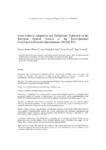Cross-cultural adaptation and preliminary validation of the european spanish version of the Developmental Coordination Disorder Questionnaire (DCDQ–ES)

Use this link to cite
http://hdl.handle.net/2183/26142Collections
- Investigación (FFISIO) [481]
Metadata
Show full item recordTitle
Cross-cultural adaptation and preliminary validation of the european spanish version of the Developmental Coordination Disorder Questionnaire (DCDQ–ES)Date
2020-05-21Citation
Montes-Montes R, Delgado-Lobete L, Pereira J, Pousada T. Cross-cultural adaptation and preliminary validation of the european spanish version of the Developmental Coordination Disorder Questionnaire (DCDQ–ES). Am J Occup Ther. 2020 Jul/Aug;74(4):7404205060p1-7404205060p10.
Abstract
[Abstract]
Importance: The Developmental Coordination Disorder Questionnaire (DCDQ) is the most widely used measure of difficulties with activities of daily living and academic performance in children with developmental coordination disorder, but this tool has not been adapted for use in Spain. Objective: To translate and cross-culturally adapt the DCDQ into European Spanish (DCDQ-ES) for use in assessing motor coordination in Spanish children. Design: Cross-cultural adaptation and preliminary validation study. Setting: Community and mainstream schools in Spain. Participants: A committee of five experts oversaw the cross-cultural adaptation process. A community-based convenience sample of 31 parents of children ages 5-14 yr was used to test the comprehensibility of the DCDQ-ES. Preliminary reliability was tested with 35 randomly selected parents of children ages 6-12 yr. Outcomes and Measures: The DCDQ was translated into European Spanish and cross-culturally adapted following international guidelines. Comprehensibility was assessed using cognitive debriefing interviews. The final version of the DCDQ-ES was used for the reliability analysis. Results: Cultural relevance and equivalence and idiomatic differences between the DCDQ and DCDQ-ES were evaluated. Comprehensibility analysis led to minor modifications that facilitated comprehension and interpretation. Internal consistency and homogeneity of the DCDQ-ES were good (Cronbach's a =.857, corrected item-total correlations = .268 - .692). Conclusions and Relevance: The DCDQ-ES is conceptually and semantically equivalent to DCDQ and was successfully cross-culturally adapted for the European Spanish context. Preliminary data suggest that the DCDQ-ES is a reliable measure of motor coordination in Spanish children. What This Article Adds: This study provides evidence of the cultural equivalence of the DCDQ-ES for use with Spanish children. Occupational therapists in Spain can use the DCDQ-ES to evaluate children's motor coordination difficulties in everyday activities.
Editor version
ISSN
0272-9490





